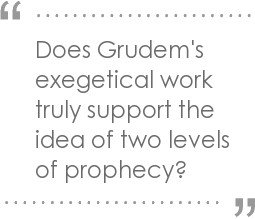Discernment and Revelation, Part 3: The Case for Cessationism
With Parts 1 and 2 as a backdrop, the question is reduced to this: Is God giving authoritative revelation on par with that which He has given in the past (much of which has been inscripturated) or is He not? If He is, then the church of Christ needs to take note and come into compliance with the modern prophecy movement, following its revelations as it would Scripture. But if the Lord is not revealing His inspired word today, then we need to reject the claims of the modern prophets and expose these supposed revelations for what they are.
This means the position taken by most on prophecy—cautious but open—is untenable. The cautious but open crowd is skeptical of the claims coming from the prophetic movement, and they are suspicious of the many “words from God” that so many evangelicals are claiming. Still, they hesitate to embrace cessationism. They are concerned about limiting God or, as it was mentioned earlier, “putting God in a box.” To this let me make two replies:
- It is okay to “put God in a box” if God, in fact, is the One who put Himself in that box. In other words, God can do anything He wants to do, but we expect God to do what He says He will do. If God has put Himself in the cessationist box we can embrace and proclaim it.
- Taking the open but cautious view really does not hold up. Either God is speaking today apart from His Word or He is not. If He is speaking, how do we determine which of the multitude of messages people claim are from Him and which are bogus? If, with Grudem, we have eliminated the tests of Deuteronomy 13 and 18, how are we to evaluate all these revelations? How do we know to whom we should listen and whom we should ignore?
Discussion
'Strangers to Fire' Blasts Back at Cessationist Movement; Defends Use of Supernatural Gifts of the Holy Spirt
Body
“[W]e’re saying that John MacArthur is stranger to the authentic fire of the Holy Spirit and of revival”
Discussion
From the Archives: Are There Two Levels of NT Prophecy?
 (Originally posted in April of 2011)
(Originally posted in April of 2011)
Did all the miraculous gifts of the Spirit, such as tongues and prophecy, cease with the completion of the New Testament? If we take the position that prophecy continues in some form, is such a view compatible with the conviction that God has given us all the authoritative revelation He intended to give (that the canon of Scripture is closed)?
In 2011, Dr. Bruce Compton (Detroit Baptist Theological Seminary) presented a paper on these questions at the Preserving the Truth Conference. What follows is a summary reflecting my understanding of Compton’s analysis. (An updated version of the paper is available here.)1
The two levels of prophecy view
Since Dr. Wayne Grudem’s work has been foundational for many who believe in a continuing gift of prophecy, Compton’s paper focuses on Grudem’s view2 that the NT speaks of two levels of prophecy: apostolic and non-apostolic. Grudem maintains that apostolic prophecy was authoritative and inerrant in the same way that Old Testament prophecy was and that this form of prophecy ceased when the NT Scriptures were completed.
Discussion
Thomas Schreiner: Why I Am a Cessationist
Discussion
Albert Mohler: "I Am a Cessationist"
Body
In light of Strange Fire conference, where do you stand on miraculous spiritual gifts?
Audio answer to a question on Strange Fire and cessationism. Starts around 12:00 mark



Discussion